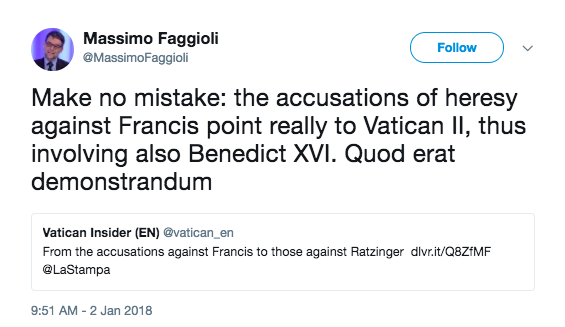On Sandro Magister’s blog this morning there’s a reply to
Antonio Livi's critique of Ratzinger, which I covered yesterday. Tellingly, the reply is by a lawyer–not a philosopher. Once again, the blog is in Italian:
Joseph Ratzinger teologo. Non “modernista” ma moderno: “Joseph Ratzinger, Theologian: Modern but not ‘Modernist’.” The lawyer/author starts by pronouncing himself “not convinced” by Livi, but then goes on to confirm exactly what Livi said: Ratzinger rejects Thomism, rejects the very notion of
praeambula fidei, and adopts instead a “modern”, i.e., Kantian, approach. In essence the lawyer is saying: It's true that Ratzinger is
not Thomist and
is Kantian--but (the lawyer simply asserts) that's just being "modern," (i.e., it's a
good thing), not "Modernist" (which, he presumably agrees, is a
bad thing, and is therefore to be denied). In fact, however, it's simple historical fact that Kantian thinking is the very basis of Modernism (cf. the links in yesterday's post, cited above). It's important to further note, however, that in attempting to make this case the lawyer quite mistakenly identifies modern science with a “methodological atheism.”
Now, it’s quite true that a scientist–insofar as he
is a scientist–need not be a metaphysician nor need he
explicitly hold any metaphysical principles in order to conduct scientific inqquiries. But by that very same token, there is nothing necessarily atheist about the scientific methodology insofar as it is scientific (as the history of science amply demonstrates). It may be fair to call the scientific method “agnostic”, but even so it is not
methodologically or consciously agnostic any more than it is methodologically atheist. Which is to say, a scientist can engage in valid science as a theist, an atheist, or an agnostic simply because such considerations don’t affect his methodology in practice–although the scientific methodology very arguably arose from theistic principles (cf. the work of
Stanley Jaki).
What Ratzinger does, and the lawyer is quite explicit about this, is to accept this supposedly methodological atheism of modern science (or, more properly, its “agnosticism”)
as controlling for philosophy. IOW, he accepts that "science" in the modern sense of the word is the only truly valid form of human knowledge, and he insists that the man of faith must bow to the scientific method as exclusively valid in all areas of human inquiry. Therefore, in Ratzinger’s view, belief that there is a cause for the existence of all that exists, which we call God, is and can
only be an hypothesis. It cannot be a certainty because it is not subject to experimental verification, which Ratzinger implicitly accepts as the only valid form of “modern” knowledge. In this Ratzinger is both very modern and very Modernist, exactly as Livi says. (Parenthetically, it's worth noting that these views are at the bottom of Ratzinger's extreme--and frequently expressed--skepticism regarding the validity of historical critical study of both Scripture as well as history more generally, and it amply explains his preference for subjective, allegorical approaches to Scripture.)
